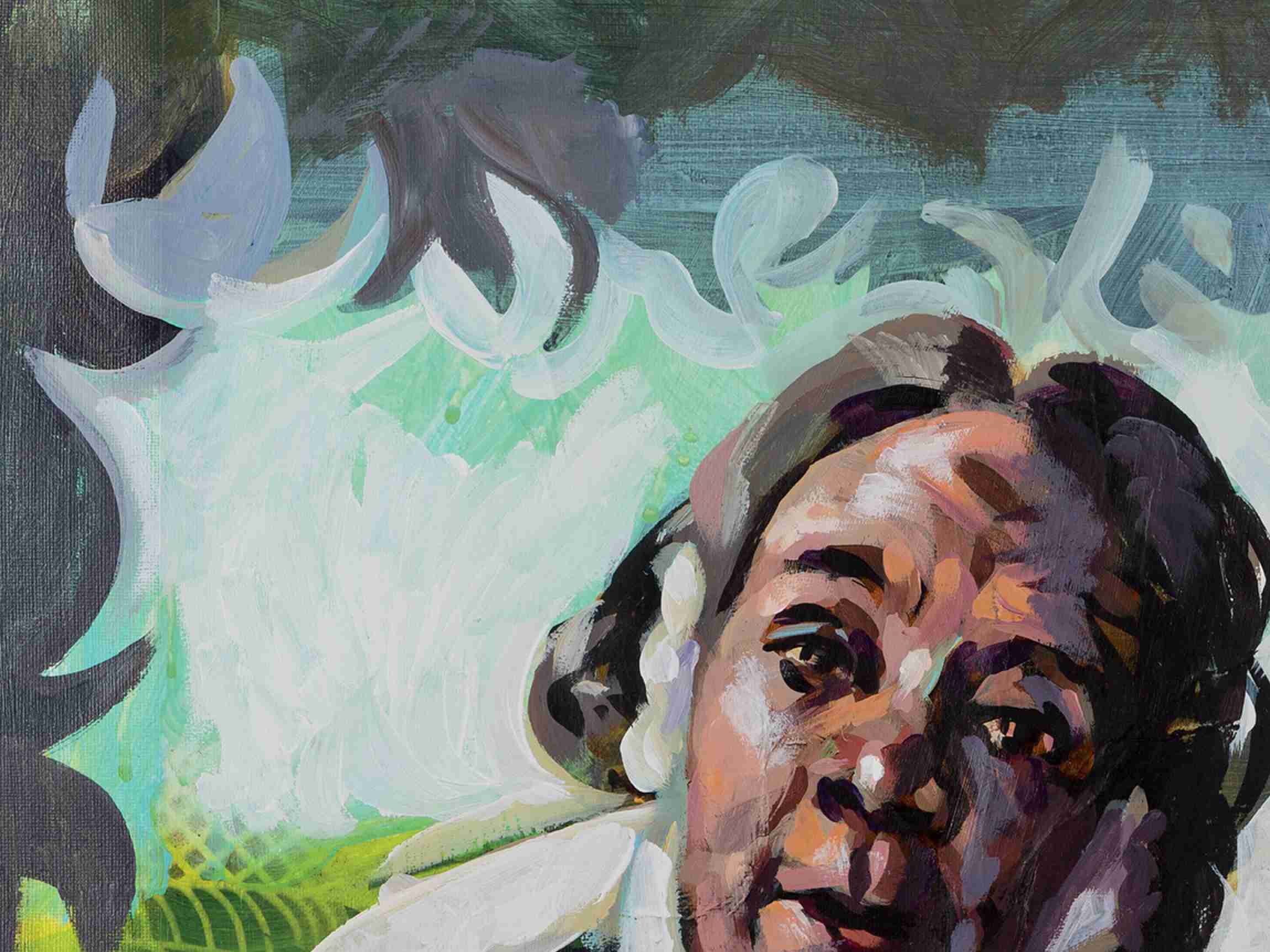

RICHARD BRUCE NUGENT
BORN: JULY 2, 1906, WASHINGTON, D.C.
DIED: MAY 27, 1987, HOBOKEN, NEW JERSEY
WRITER, PAINTER
I FIRST LEARNED OF RICHARD BRUCE NUGENT when I was about thirty years old. I had been living in Washington, D.C., for a couple of years when a friend of mine, Guy Anthony, decided he wanted to start a nonprofit organization dedicated to uplifting and supporting Black gay men. Several of us came together to help him create Black, Gifted & Whole, whose mission is to financially support young Black gay men going into college.
To fund this operation, we had an awards show in Washington, D.C., that honored several Black gay men doing major advocacy work in our community. When it came time to name the awards, we wanted to choose people from history who helped shape the Black queer community. In doing our research, we stumbled upon Richard Bruce Nugent. We were blown away to learn about his work and contributions to the Black queer community. Before then, none of us had ever really known he existed.
As I struggled with my identity in childhood and young adulthood, I longed to know that there were people who existed before me. I was desperate for someone to look up to. That someone should have been Richard—an out Black gay man who was a writer and a creative pioneer during the Harlem Renaissance. Black queer kids deserve to know they have heroes. Richard ensured that his peers understood that Black queer people are just as important to culture, Blackness, and queerness as anyone else. Maybe even more important.
One thread running through the Harlem Renaissance—and this book—is an experience called “passing.” In general, the verb pass means to identify yourself as something you are not. In the context of Black communities, passing occurs when a Black person with extremely fair skin (due to any number of reasons related to genetics) presents themselves or allows themselves to be perceived as a white person. During slavery, light-skinned children were frequently born to Black mothers who had been raped by white men. We can look at the children Thomas Jefferson had with Sally Hemings, an enslaved woman who worked on his estate, Monticello. As adults, two of Sally’s children lived in the Black community while two passed into the white community. In my own family, there were stories of how my biracial great-grandmother, “Grampsie,” could pass for white when she was a child and even at certain times as an adult. The word passing can also refer to the ability of a queer person to exist in heterosexual spaces without their queerness becoming known.
Because of his skin tone, Richard Bruce Nugent was able to live parts of his early life in a white community undetected. Richard worked as a white man in Washington, D.C., to earn higher wages and avoid the stigma of living as a Black man in America. That’s a stigma that has unfortunately still not changed in this country, even today. He did, however, eventually become fully invested in the Black community throughout the rest of his adult life.
Richard met Langston Hughes while in D.C., and their friendship helped push Richard into a writing career. That is simply the magic that lives within Black folks. I always say you never know who will change the trajectory of your life. But when you meet that person, you just know—and you gotta lean into that relationship. It was 2013 when I met my best friend, Preston Mitchum. He was the first person to ever tell me to write (for a living). From that moment, I’ve never stopped writing.
Richard’s friendship with Langston was also part of why Richard moved to New York City. This is one of several things Richard and I have in common. I moved from Washington, D.C., to New York to become a writer—but I was an out Black gay-identified man at the time. And upon his arrival in the city, Richard did a full 180 and began living his life as a Black gay man. He ditched his desk job to pursue the arts—another commonality he and I share.
I was a math whiz as a kid and young adult. Because I was good at math, I always assumed my career path would involve something with numbers. So I went to college and got a degree in finance. Even though I was great at math, I was also great at writing and orating. However, I was never pushed into either of those fields, nor did I know that they would become my passions. So, for nearly a decade, I worked in finance and did well. Until I lost the “like” for it. I’m not even sure if I ever really loved it.
It was then that I decided to switch fields and go into HIV work. I also started freelance writing. The writing made me happy, as did working in my community. The change in careers filled me with life. I was doing what I was passionate about instead of what I was good at. I loved how Richard did this, too, because I think more teens and young adults should follow their passions early in life. I made the switch around age thirty, but who knows where I would be if I had figured it out earlier.
What I love about Richard’s writing is that it challenged everyone, even the greats within his own community. He didn’t write like the other gay writers of his time. They—specifically Alain Locke—wrote about homosexuality much more covertly, using coded language and themes. But Richard wrote a short story titled “Smoke, Lilies and Jade” that explored an interracial bisexual love affair starring a Black man torn between a Black woman and a white Latin man. It shone a light onto a dynamic that existed in Harlem but that certainly wasn’t meant to be talked about in public.
Alain chastised “Smoke, Lilies and Jade” for celebrating “effeminacy and decadence,” a version of Black manhood he didn’t think should be in the public eye. I found this to be very interesting. Yet again, it goes to show how deep-seated internalized homophobia and misogyny was during the Harlem Renaissance. So deep that even the heroes like Alain Locke couldn’t make space for creatives who pushed against society’s limits. Alain was essentially saying that homosexuality couldn’t be discussed unless it was through a lens of masculinity and hardship.
It reminds me of our time now in the LGBTQIA+ community. You will often see a person saying “no femmes” in their dating app profiles. The community is still very anti-femme—because those who are femme are seen as a threat to masculinity. This is again a nod to the notion of queer people using “masculinity” as a form of passing in heterosexual communities. There is this unwarranted fear of gay people being viewed as femme. Even back in Richard Bruce Nugent’s time, this was true. For me, it reduces us to our oppressors’ constructs. I’m glad that so many queer folks, like Richard and me, have chosen not to live in those boxes. I hope we continue to free others still stuck in them.
I know that our writing isn’t a monolith. But I can also understand the concern some have when writers cover certain topics that they deem harmful to the image of our community. In Alain’s case, he thought Richard’s writing made homosexuality appear weak. However, because we are not monolithic, we should be providing space for all our writings and perspectives. I’m grateful to know that Richard wasn’t afraid to go against the grain with his art. It opened the door for me to do the same.
In 2021, “Smoke, Lilies and Jade” was turned into a short film by Deondray Gossfield and Quincy LeNear. I remember watching it and thinking how beautiful and poetic the story of this bisexual man stuck between two lovers was. It spoke volumes about the Harlem Renaissance, a time not only of heightened creativity but also of sexual exploration and fantasy—despite the societal pressure that forced some people to live one way in public and another in private.
Which is why it was interesting to find out that Richard Bruce Nugent eventually married a woman, Grace Marr. Their union lasted from 1952 until Grace’s death by suicide in 1969. It was always unclear why they married, since it was confirmed they were never romantic partners. I’d suspect it was because queerness during the 1950s was becoming more scrutinized and therefore dangerous, especially for those who were public about it. So maybe the marriage served as protection for Richard.
Despite this, rumors swirled that Grace loved Richard and was intent on changing his sexuality. But rumors are just that. And despite Grace’s attempt, Richard remained gay. In a 1983 interview with Thomas Wirth, editor of Gay Rebel of the Harlem Renaissance, a selection of his works, Richard said:
You see, I am a homosexual.
I have never been in what they call “the closet.” It has never occurred to me it was anything to be ashamed of, and it never occurred to me that it was anybody’s business but mine. You know that good old Negro song: “Ain’t Nobody’s Business What I Do”? And the times were very different then. Everybody did what they wanted to do. And who cared?
May more people read Richard Bruce Nugent’s story and find the courage to live their life as unapologetically as he did. He is an inspiration for me and for future writers and artists who are afraid that their work can’t push past the limitations of society. He is the reminder that change ain’t overnight but is damn sure necessary.